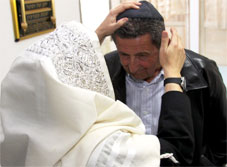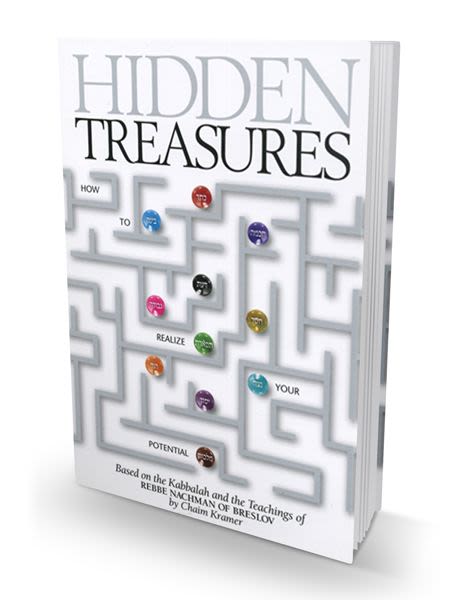
Vayelech: Rosh Hashana with the Tzaddik
What is the importance of spending Rosh Hashana with the tzaddik? Rebbe Nachman teaches that only the tzaddikim of the generation know the essence of prayer...

"Assemble unto me all the elders of your tribes and your officers and I will speak in their ears…"(Deuteronomy 31:28).
The above passage raises two questions. First, we already learned in Parshat Nitzavim that every single man, woman and child of the Children of Israel were gathered to hear Moses's address on the day he died, so why must the Torah make the seemingly superfluous statement that the elders and officers were there as well? Second, why is this particular Torah portion read close to Rosh Hashana?
Rebbe Nachman of Breslev teaches (Likutei Moharan I:10) that only the tzaddikim of the generation know the essence of prayer. In stark contrast, the arrogant don't want to frequent the tzaddikim, for they say that they are capable of praying on their own, and they also prevent others from going to tzaddikim. Rebbe Nachman adds the only way to nullify arrogance – which is idolatry in every sense of the word – is by getting close to tzaddikim. Elsewhere (ibid, 11), Rebbe Nachman says that arrogance and blemished personal holiness go together. A person who fails to guard personal holiness becomes arrogant, and considers himself an entity that should be worshipped. As such, he severely blemishes Hashem's holy Name.
Let's elaborate on Rebbe Nachman's above teaching: the arrogant person is not satisfied with the limitations  that the Torah's laws place on his life, for in the framework of religious law, he's not allowed to satiate his bodily lust and appetites in the way he desires. He therefore breaches Halachic limitations, which is nothing other than Divine jurisprudence. In revolting against Hashem's law as codified in the Shulchan Aruch (Code of Jewish Law) and clarified by the generation's Halachic authorities, a person casts off the yoke of Heaven. And, in blemishing personal holiness, he cuts himself off from Hashem altogether. His lust and bodily appetites are the dictating force in his life, for his does everything to satisfy them; these are the "other gods" that he is serving. Such a person is consequently, by definition, an idolater.
that the Torah's laws place on his life, for in the framework of religious law, he's not allowed to satiate his bodily lust and appetites in the way he desires. He therefore breaches Halachic limitations, which is nothing other than Divine jurisprudence. In revolting against Hashem's law as codified in the Shulchan Aruch (Code of Jewish Law) and clarified by the generation's Halachic authorities, a person casts off the yoke of Heaven. And, in blemishing personal holiness, he cuts himself off from Hashem altogether. His lust and bodily appetites are the dictating force in his life, for his does everything to satisfy them; these are the "other gods" that he is serving. Such a person is consequently, by definition, an idolater.
On the other hand, if a person with a lust or bodily-appetite problem would get close to a tzaddik, he'd be saved. Even a heart of stone melts when standing in front of a true tzaddik, the generation's spiritual leader. One cannot be arrogant in his presence, for he feels that he is standing before an individual of greatness. This prepares the person to receive and accept the tzaddik's advice, which can save him from the many sicknesses of the soul, particularly breaches in personal holiness. When the person takes leave of the tzaddik, he has a yearning to do teshuva. Once he does, his entire life turns around for the better.
It's bad enough that the arrogant person doesn't come to the tzaddik. But, by preventing and discouraging others from doing so, he falls into the category of a stumbling block in the public domain. By preventing others from doing a mitzva, the gates of teshuva will be blocked to him (see Rambam, Laws of Teshuva, 8:1). This is appalling, for it means that even Yom Kippur won't atone for him, for Yom Kippur only atones when a person does sincere teshuva.
So why then did the Torah make a special stipulation that the elders and officers be present when Moses assembled the People of Israel?
First, the elders and the officers had the special task of making sure that everyone was present, double-checking the fact the no one considered himself a tzaddik on his own right that doesn't need the services of Moses, the generation's true tzaddik.
Second, the elders and the officers were to make sure that no one prevented anyone from getting close to Joshua, Moses's student and successor as the tzaddik and spiritual guide of the next generation.
Third, Moses was letting them know that he knew that they would succumb to arrogance after Joshua died, for without the direction of the true tzaddik, they'd shake off the yoke of Heaven. We see the power of Moses's far reaching prophetic spirit when we're told: "And the Children of Israel did evil in the eyes of Hashem…and they followed other gods" (Judges 2: 11-12). This happens when each person does as he pleases, for arrogance leads to idolatry just as Rebbe Nachman says. The spiritual nosedive begins with arrogance, then chasing bodily lust and appetites while throwing off the yoke of Heaven, and finally idolatry. The elders and the officers were charged with the task of preventing such a spiritual downfall. They were supposed to encourage the general populace to get close to the true tzaddik who succeeded Joshua.
We can now understand why we read Parshat Vayelech near the time of Rosh Hashana, to implore every Jew – especially those with spiritual authority such as rabbis and community leaders – not to stand in the way of those who want to go to the true tzaddik on Rosh Hashana. No one should be on the list of those who prevent another person from doing a mitzva, Heaven forbid.
Each individual must do his utmost to seek his personal rectification, knock down the walls of arrogance that stand between him and Hashem and to get closer to the true tzaddik. Rosh Hashana is the opportune time for doing all three. And, even if a person doesn't succeed in totally rectifying himself, the Mishna says, "What is connected to purity is pure" (tractate Kelim, ch.12, second Mishna). On the Day of Judgment, by law of the Mishna, all those together with the tzaddik are deemed as if they too are tzaddikim. As such, by spending Rosh Hashana with the tzaddik, we'll all undoubtedly be written in the Book of Life for a wonderful New Year, amen!










9/15/2014
re akiva I used to think that way. If you care so much to pursue and comment, it shows how you are invested in this issue. Please, please go for yourself and your future generations. Here are a few links for you to expand your outlook on this matter: http://www.breslov.org/why-a-tzaddik-why-rebbe-nachman-why-uman/ http://www.youtube.com/watch?v=smERfaC0CtU you can skip to 10 minutes to get right to your question…. http://azamra.org/Essential/tzaddik.htm this one is from Rav Ginzburg http://www.inner.org/wp-content/uploads/2014/03/4%2BAdar%2B5773-dist.pdf
9/15/2014
I used to think that way. If you care so much to pursue and comment, it shows how you are invested in this issue. Please, please go for yourself and your future generations. Here are a few links for you to expand your outlook on this matter: http://www.breslov.org/why-a-tzaddik-why-rebbe-nachman-why-uman/ http://www.youtube.com/watch?v=smERfaC0CtU you can skip to 10 minutes to get right to your question…. http://azamra.org/Essential/tzaddik.htm this one is from Rav Ginzburg http://www.inner.org/wp-content/uploads/2014/03/4%2BAdar%2B5773-dist.pdf
9/14/2014
Tzaddik The article is a great read..However,in Judaism,we don't believe in idealizing personalities.We don't believe in Intermediaries. How can we say that Rebbe Nachman is the true tzaddik?It says there was never a prophet Like Moses.So if anything we should look at Moses as being a true tzaddik..Is this not something that may have been misinterpreted amongst Breslov?